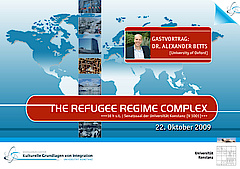The Refugee Regime Complex
22. Oktober 2009
Vortrag in englischer Sprache
Dr. Alexander Betts ist Hedley Bull Research Fellow in International Relations in the Department of Politics and International Relations an der University of Oxford. Zusätzlich zu dieser Position ist er Senior Research Associate im Global Economic Governance Programme (GEG) und am Centre for International Studies (CIS). Seine bisherigen Qualifikationen umfassen ein First Class Honours Degree in Economics, einen MSc in International Relations (with Distinction), einen MPhil in Development Studies (with Distinction), und einen DPhil in International Relations.
Abstract
At the time of its creation, the refugee regime was relatively isolated amongst international institutions regulating human mobility. However, since its creation, globalization and interdependence have led to rapid institutional proliferation both in human mobility regimes on travel and labour migration, and in non- mobility regimes such as human rights, humanitarianism, and security. These new regimes overlap with the refugee regime in significant ways, some complementary and some contradictory, relocating some of the most relevant politics for refugee protection into other issue-areas.
This lecture inductively examines the impact of regime complexity on the global refugee regime. It argues that it is no longer conceptually viable to speak of a compartmentalised refugee regime, but rather that there is now a ‘refugee regime complex’. In this complex the regime overlaps with a range of other regimes within which states engage in forms of institutionalised cooperation that has an impact upon their behaviour in relation to refugees.
The lecture examines the causal impact of this institutional proliferation on, firstly, international cooperation on refugee protection and, secondly, change in the role and strategy of the international organization with responsibility for refugee protection, the Office of the United Nations High Commissioner for Refugees (UNHCR). It suggests that the analysis of the refugee regime has important theoretical implications because of the hypotheses that it generates in relation to the relationship between institutional proliferation and international organization adaptation.
22. Oktober 2009, 16-18 Uhr
Universität Konstanz, Senatssaal (V 1001)
Kontakt
Daniel Kirchner
daniel.kirchner[at]uni-konstanz.de
